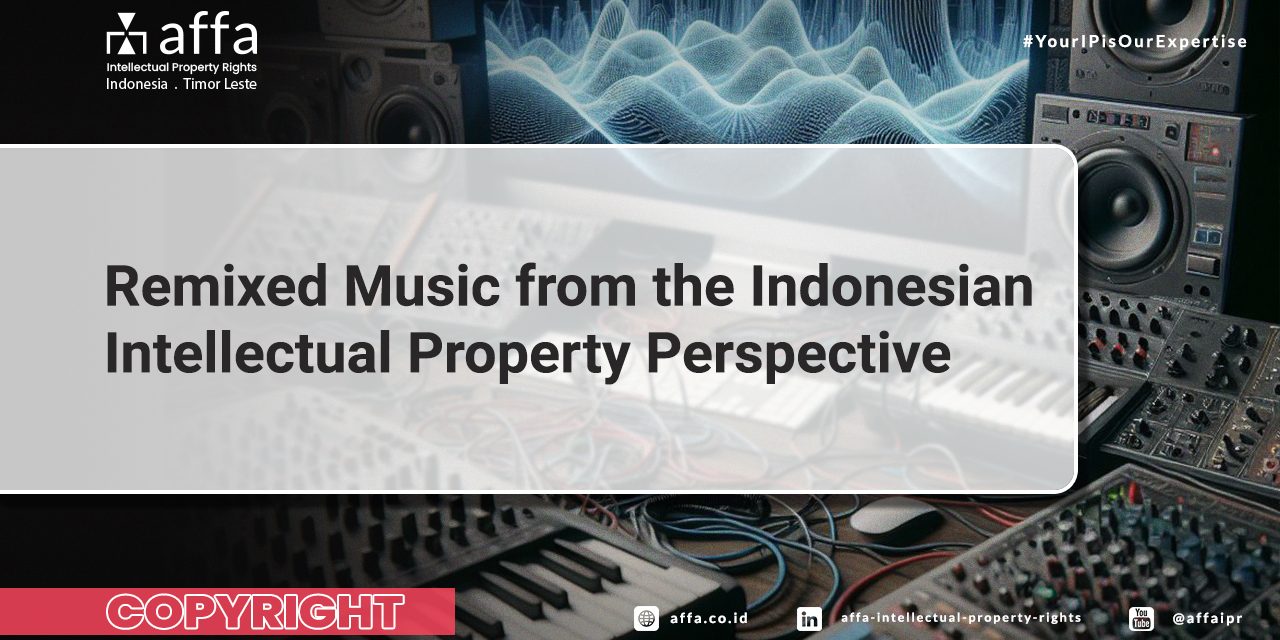Remixed Music from the Indonesian Intellectual Property Perspective
The weekend is just around the corner. Which club will you go to to spend the night? The club with the most comfortable atmosphere? In the middle of the city? On the beach? Club with makes the best drink? Or the one with the most popular live music?
Live music has become a form of entertainment that is inseparable from nightlife. With the mix of popular and new songs sung, we can be hypnotized for a moment and forget all our problems. But for those of you who are on the side of event organizers, venue managers, or artists who perform this music/song, don’t let yourself get into trouble.
Because music/songs with or without text (lyrics), in Article 40 of the Law of the Republic of Indonesia Number 28 of 2014 concerning Copyright, is stated as a form of protected work. For these creations, there are Exclusive Rights (moral and economic) holders entitled to royalties from every music/song performed. If done without paying royalties, performing music/songs without permission for commercial purposes can be categorized as a Copyright violation.
However, Who Should Pay the Royalties?
In Article 3 of the Republic of Indonesia Government Regulation Number 56 of 2021 concerning the Management of Song and/or Music Copyright Royalties, it is regulated that every person can make commercial use of songs and/or music in the form of commercial public services by paying royalties to the Creator, Copyright Holders, and/or Related Rights Owners through the National Collective Management Organization (LMKN).
Commercial public services include commercial seminars and conferences; restaurants, cafes, pubs, bars, lounges, nightclubs, and discotheques; music concerts; airplanes, buses, trains, and ships; exhibitions and fairs; cinema; telephone waiting tone; banks and offices; shops; recreation center; television broadcasting institutions; radio broadcasting institutions; hotels, hotel rooms, and hotel facilities; and karaoke business.
Regarding Music Mix performed in restaurants, cafes, pubs, bars, discotheques, or nightclubs, Article 3 GR No. 56 of 2021 concerning the Management of Song and/or Music Copyright Royalties has specifically regulated the rates as follows:
- Restaurants and Cafes
Royalties are determined per seat per year, with the provisions of the Creator royalty being IDR 60,000 per seat per year and the Related Rights royalty being IDR 60,000 per seat per year. - Pubs, Bars, and Lounges
Royalties are determined per square meter per year. The royalty rate for the Author’s Rights is IDR 180,000 per square meter per year, and the royalty rate for Related Rights is IDR 180,000 per square meter per year. - Discotheques and Nightclubs
Royalties are determined per square meter per year. The royalty rate for the Author’s Rights is IDR 250,000 per square meter per year, and the royalty rate for Related Rights is IDR 180,000 per square meter per year.
Note: Author’s Rights are royalties given to the Creator, while Related Rights are royalties given to musicians, original singers (performers), and producers of the song/music.
Because Creators or recipients of Related Rights do not always know when and where their songs are performed, the government has given authority to LMKN to collect royalties and distribute them to Creators and recipients of Related Rights. Therefore, if you are a restaurant and cafe, pub, bar and lounge, discotheque, and nightclub manager, you will be the one who will be charged royalties for the songs/music held inside your business, not the artist or performer who performs the music.
Before LMKN inspects your business, it would be a good idea for you first to carry out the following procedures:
- Submit a license application to the Copyright holder or Related Rights owner through LMKN;
- The license agreement is recorded by the Minister of Law and Human Rights by statutory provisions;
- Provide reports on the use of songs and/or music to LMKN via the Song and/or Music Information System (“SILM” Platform);
- Pay royalties to Creators, Copyright holders, and/or Related Rights owners through LMKN;
Based on the rules above, royalty payments are not explicitly charged per song but are based on the number of seats or the size of your commercial area. But you must know what song and/or music is being performed so that you can accurately report it through SILM, and the creator and/or recipient of related rights can obtain their rights properly. You can then hold proof of royalty payments to LMKN if, in the future, there is a lawsuit from the creator who objects to the use of their work in your place.
What if the Music Mix is commercialized?
Sometimes, DJs also record and distribute their favorite remixes, even selling them on a limited basis to their fans. Is this an unlawful act?
Returning to the rules regarding the Exclusive Rights of a music/song, where Article 9 of the Copyright Law states that only the Copyright Holder has the Economic Rights to adapt, arrange, and transform the work, as well as copy and use commercially, so to be able to do this, these DJs must obtain permission by submitting a license application to the Copyright holder or Related Rights owner. Otherwise, as regulated in Article 113 concerning Criminal Provisions for Copyright Infringement, “Every person who fulfills the elements as stated in
as intended in paragraph (3), which is committed in the form of piracy, shall be punished with imprisonment for a maximum of 10 (ten) years and/or a fine of a maximum of IDR 4,000,000,000.00 (four billion rupiah).”
After understanding the risks, if you are a DJ or musician and a live music organizer, you have to be more aware of implementing your business by applicable regulations. If you have further questions regarding commercial use of music/songs, Copyright, or other Intellectual Property, don’t hesitate to contact us via [email protected].







